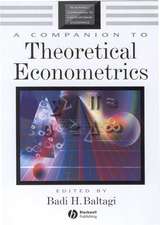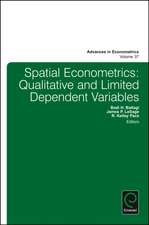Panel Data: Theory and Applications: Studies in Empirical Economics
Editat de Badi H. Baltagien Limba Engleză Hardback – 16 apr 2004
| Toate formatele și edițiile | Preț | Express |
|---|---|---|
| Paperback (1) | 645.14 lei 43-57 zile | |
| Physica-Verlag HD – 19 oct 2010 | 645.14 lei 43-57 zile | |
| Hardback (1) | 651.34 lei 43-57 zile | |
| Physica-Verlag HD – 16 apr 2004 | 651.34 lei 43-57 zile |
Din seria Studies in Empirical Economics
- 15%
 Preț: 635.01 lei
Preț: 635.01 lei - 18%
 Preț: 954.77 lei
Preț: 954.77 lei - 15%
 Preț: 647.73 lei
Preț: 647.73 lei - 18%
 Preț: 947.85 lei
Preț: 947.85 lei - 15%
 Preț: 645.28 lei
Preț: 645.28 lei - 15%
 Preț: 642.68 lei
Preț: 642.68 lei - 15%
 Preț: 646.62 lei
Preț: 646.62 lei - 15%
 Preț: 644.95 lei
Preț: 644.95 lei - 15%
 Preț: 638.43 lei
Preț: 638.43 lei - 15%
 Preț: 634.00 lei
Preț: 634.00 lei - 15%
 Preț: 637.78 lei
Preț: 637.78 lei - 15%
 Preț: 639.08 lei
Preț: 639.08 lei -
 Preț: 381.21 lei
Preț: 381.21 lei -
 Preț: 379.09 lei
Preț: 379.09 lei - 15%
 Preț: 633.53 lei
Preț: 633.53 lei -
 Preț: 385.25 lei
Preț: 385.25 lei - 15%
 Preț: 636.94 lei
Preț: 636.94 lei -
 Preț: 383.33 lei
Preț: 383.33 lei -
 Preț: 380.25 lei
Preț: 380.25 lei - 15%
 Preț: 634.32 lei
Preț: 634.32 lei -
 Preț: 381.98 lei
Preț: 381.98 lei - 15%
 Preț: 640.37 lei
Preț: 640.37 lei
Preț: 651.34 lei
Preț vechi: 766.28 lei
-15% Nou
Puncte Express: 977
Preț estimativ în valută:
124.63€ • 130.48$ • 103.13£
124.63€ • 130.48$ • 103.13£
Carte tipărită la comandă
Livrare economică 07-21 aprilie
Preluare comenzi: 021 569.72.76
Specificații
ISBN-13: 9783790801422
ISBN-10: 3790801429
Pagini: 392
Ilustrații: VIII, 380 p.
Dimensiuni: 155 x 235 x 27 mm
Greutate: 0.72 kg
Ediția:2004
Editura: Physica-Verlag HD
Colecția Physica
Seria Studies in Empirical Economics
Locul publicării:Heidelberg, Germany
ISBN-10: 3790801429
Pagini: 392
Ilustrații: VIII, 380 p.
Dimensiuni: 155 x 235 x 27 mm
Greutate: 0.72 kg
Ediția:2004
Editura: Physica-Verlag HD
Colecția Physica
Seria Studies in Empirical Economics
Locul publicării:Heidelberg, Germany
Public țintă
ResearchCuprins
From the Contents: Analyzing the effect of dynamically assigned treatments using duration models, binary treatment models, and panel data models.- Convenient estimators for the panel probit model.- Simulation-based inference in dynamic panel probit models.- Maximum-likelihood based inference in the two-way random effects model with serially correlated time effects.- Testing poolability in a system of dynamic regressions with nonspherical disturbances.- Tobin-q: Forecast performance for hierarchical Bayes, shrinkage, heterogeneous and homogeneous panel data estimators.- The effect of uncertainty on UK investment authorisation: Homogeneous vs. heterogeneous estimators.-Reinterpreting the performance of immigrant wages from panel data.- Inflation and growth: Explaining a negative effect.- Efficiency measurement using a latent class stochastic frontier model.- Productivity and technical change: Measurement and testing.- Modeling corner solutions with panel data: Application to the industrial energy demand in France.
Textul de pe ultima copertă
The present book is a collection of panel data papers, both theoretical and applied. Theoretical topics include methodology papers on panel data probit models, treatment models, error component models with an ARMA process on the time specific effects, asymptotic tests for poolability and their bootstrapped versions, confidence intervals for a doubly heteroskedastic stochastic production frontiers, estimation of semiparametric dynamic panel data models and review of survey attrition and nonresponse in the European Community Household Panel. Applications include the impact of uncertainty on UK investment, a Tobin-q investment model using US firm data, technical change in the Japanese chemical industry, cost efficiency of Spanish banks, the problem of immigrant integration in Canada, an analysis of the dynamics of individual health in the UK, the relationship between inflation and growth among OECD and APEC countries, modeling corner solutions in the industrial energy demand in the pulp and paper sector in France, technical efficiency of cereal farms in England, employment-supported training in Canada, earnings trends across skill groups and industries in West Germany, employment effects of education for disabled workers in Norway, a three-way gravity model with bilateral interaction effects for APEC countries and a panel cointegration approach to the Feldstein-Horioka investment-saving puzzle.




















